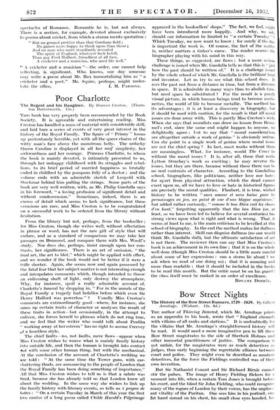Bow Street Nights
The History of the Bow Street Runners, 1729-1829. By Gilbert Armitage. (Wishing,. 12s. 6d.) THE author of Thieving Detected, which Mr. Armitage print; as an appendix to his book, wrote that " England abounds with villains of all ranks and stations." It is undoubtedly for the villains that Mr. Armitage's straightforward history will be read. It would need a more imaginative pen to lift these Bow Street magistrates to the side of Sherlock Holmes and other immortal practitioners of justice. The comparison is not unfair, for the magistrates were as much detectives as judges, thus early beginning the regrettable alliance between court and police. They might even be described as amateur detectives, for the force the Fieldings controlled was of their own invention.
But Sir Nathaniel Conant and Sir Richard Birnie cannot stir the pulses. The image of Henry Fielding flickers for a moment into life, when a certain Tom Jones is brought before his court, and the blind Sir John Fielding, who could recognize many of the rogues of London by their voices, has the unpleas- ant vitality of the Puritan. Orie sees him in his portrait, one fat hand spread on his chest, his small close eyes hooded, his chin hidden in flesh. Unable to see the plays at Drury Lane, he was certain that what he could not see was evil. He objected even to his brother's plays : " I wish it were possible to encourage his economy of oaths. Further the two expres- 40/N, spindle-shanked beau' and ' rampant woman's immorality' are most abominable." The rogues appeal more to the imagination than the magistrates : the Mr.•Smith who masqueraded as a clergyman at St. Martin-in-the-Fields, marrying hundreds of couples before his fraud was discovered ; and Charles. Price, the expert in disguise, who remained at large for more than ten years because the runners could not keep pace with -his changes, and who was identified piecemeal at his trial by the eyes, nose, mouth and chin.
Nevertheless, it should have been possible to write a more exciting record of the Bow Street magistrates. In a London lit only at every tenth house they- had to battle not only against the most squalid forms of crime : decapitations with penknives, bodies in baskets on the way to the back doors of famous surgeons, conditions when a decomposing body found in a Thames sewer was assumed to be the refuse of a dissecting-
room but against the corruption of their own force and of the public they served. In " The Brown Bear," the tavern in Bow Street, runners came to financial arrangements with thieves, and a bank after a robbery would send a representative to compound for the return of the cash.
It was a losing fight that the magistrates carried on. The highwaymen were driven from the roads by their patrols, but crime in London continued to increase: The street lamps did more than the runners to alter its character ; small thieves and shabby murderers lost their dark coverts, and under the lamps the decapitating penknife gave place to the duellist's or the assassin's sword ; Sarah Metyard and her daughter, who called her mother " the perfumer," because of the smell of their apprentice's dead body upstairs, was succeeded by Thistlewood, the fanatic, who plotted to murder the whole Cabinet at dinner in Grosvenor Square. But the drawing- rooms had as corrupting an influence as " The Brown Bear."
It was high time for the Bow Street force to be superseded when a runner could become the pet of society, his name, like a foreign musician's, appearing on the invitation cards to great houses. " God knows how many great men I have taken," Townsend boasted :
" Why, Sir Richard, I was employed to apprehend the late Duke of Norfolk, and Sir John Honeywood, when they went out to light a duel ; and I also apprehended Colonel Macneanara, and Colonel Harvey-Aston, the latter of whom was afterwards shot in a duel in -the East Indies. I also apprehended tho late Marquis Townsend and Mr. Ponsonby on a like occasion."
GRAHAM GREENE.































 Previous page
Previous page